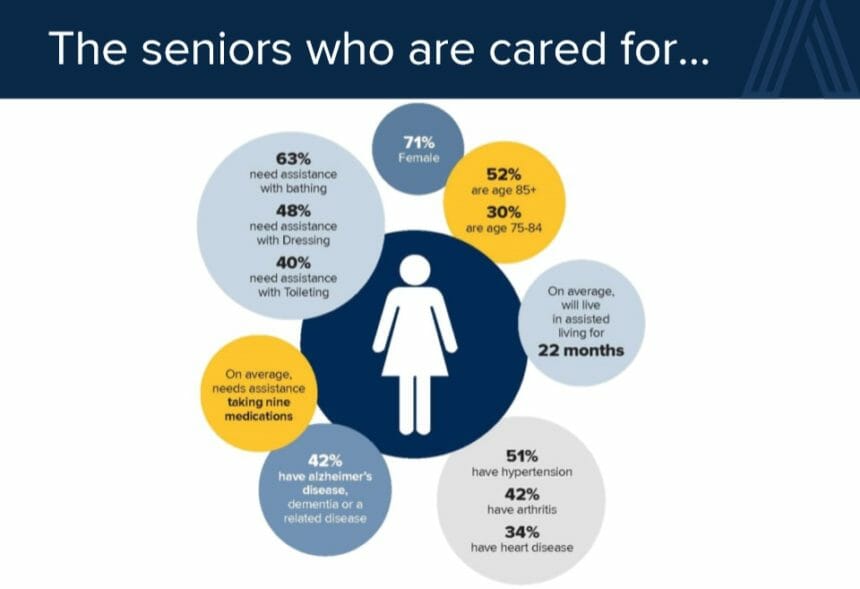
A new administration and Congress could bring new scrutiny, legislation and regulation to an industry already daunted by COVID-19 challenges, according to speakers Thursday at an Argentum webinar on the changing political landscape.
Personal protective equipment and staff expenses related to the pandemic are expected to cost the senior living industry close to $15 billion, panelists noted. At the same time, occupancy declines and losses due to drastic reductions in resident move-ins are expected to total $15 billion.
Paul Williams, Argentum’s vice president of government relations, described those losses as long-term, compounding and unsustainable.
To date, assisted living providers have received relatively little federal relief. Although $175 billion has been allocated to the Provider Relief Fund, assisted living communities have received only $3 billion (1.7%), compared with the $145 billion (83%) allocated to hospitals, nursing homes and other healthcare providers.
In a January survey of Argentum member providers, speakers said, almost 75% of respondents said that expenses have increased significantly during the pandemic, 50% reported receiving relief for less than 1% of losses they have incurred to date, and 50% reported that community closures are imminent unless they receive additional financial relief.
Political change
With the new administration, overall healthcare priorities are expected to be the Affordable Care Act, COVID-19 and the vaccination rollout. Maggie Elehwany, Argentum senior vice president of public affairs, said it will be important to the association to focus on educating new members of Congress and members of the administration about the fragile population served by the senior living industry.
Although the Democrats will maintain a slim majority in the Senate, bipartisan support will be key to moving agendas forward, she said.
“We have a political sea of change occurring in Washington,” Elehwany said. “The challenges of the senior living industry remain more daunting than ever in the history of the industry.”
Elehwany said that Argentum and the senior living industry will be focused on key leaders of top Senate committees, including the Senate Finance Committee; the Health, Education, Labor and Pension Committee; the Special Committee on Aging; and the Appropriations Committee.
Impactful legislation
Another COVID relief bill, possibly as early as March, tops the list of anticipated legislation affecting senior living, webinar speakers said. Elehwany said that providers should expect additional dollars from the Provider Relief Fund, as well as funding for vaccine distribution.
But the industry also can expect additional oversight legislation, she said. The high percentage of COVID-19 deaths in long-term care settings means the industry can look for additional federal scrutiny, including long-term care reporting requirements on infection prevention and control, staffing, emergency preparedness and resident socialization.
The industry also can expect congressional investigations and presidential commissions tasked with identifying challenges related to COVID-19 and infectious disease in long-term care settings.
Elehwany said she also sees possible bipartisan support for long-term care tax relief, with credits for informal caregivers and tax benefits for long-term care insurance. Expanding Medicaid to include payment for long-term care needs also is on the table.
When it comes to unions and labor, Williams said that anticipated legislative priorities include paid sick leave, caregiver leave, minimum wage increases and pay equity. Much of the labor agenda also likely will be in the form of regulatory changes, he added.
Just as important as what to expect is what not to expect, speakers said. COVID-related liability or tort reform are not expected at the federal level. Instead, state reform efforts will become even more important.
“What’s been unfortunate, through the pandemic, is trial attorneys are lining up and already filed causes of action against people not only in long-term care and the senior living industry, but all healthcare professions,” Williams said.
Join the fight
Argentum has launched a new program, Argentum Advocates, to share critical policy issues and opportunities for advocacy to affect the future of the senior living industry.
Benefits of the program, Argentum said, include targeted advocacy assistance, briefings on federal legislative and regulatory information, tailored action alerts, assistance contacting lawmakers, scheduling meetings with congressional delegations, and opportunities to attend Capitol Hill forums focused on the needs of senior living.
The opt-in program is open to all. Anyone interested can sign up here.




